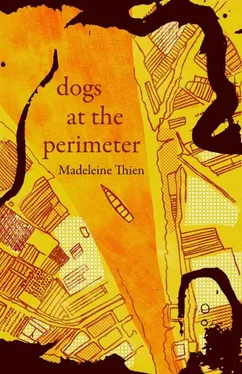“Nuong,” Hiroji began.
“I don’t even know if that’s my name. It’s what my brothers called me. It’s just the name I remember.”
In November, a few weeks before Hiroji disappeared, he had received a letter from Nuong. Hiroji told me that the boy’s American family had gone to visit him in Phnom Penh. They had decided to invest in a small hotel that Nuong was now managing. The Lowell Hotel , Nuong wrote. Their idea . Here was his telephone number, here was his address. Send me a photograph of James , Nuong wrote. Don’t forget. I want to keep looking.
Hiroji told me that he remembered following Nuong to the border. The boy stood there, in the dry, sunlit field, holding a stone in his hands, staring across the bridge. The Khmer Rouge guard taunted Nuong to step forward, to throw the stone, to cross the bridge back into Cambodia, to come home, but the boy just stood there staring like a sick dog, a dying child. Come home. If you come home, Angkar will give you everything you want. “Nuong,” Hiroji had called. But he already knew what would happen. This was a country, he had learned, in which no one responded to their names. Names were empty syllables, signifying nothing, lost as easily as a suit of clothes, a brother or a sister, an entire world.
[end]
Unable to settle, I put the espresso maker on the stove. While the coffee warbles up through its pipes, I free a chocolate bar from its wrapper, set it near the element so that it melts a little in the heat, and then I carry it to Hiroji’s desk, eating it slowly.
Tavy’s email has arrived, along with the scans of Sorya’s file. My darling James , Sorya’s letters begin. There are six of them, dating from April 1975 to the end of that year.
I read them through once, and then again. The screen glows whitely in the dark room and outside all is hushed. From the pocket of my coat, I retrieve the yellow notebook and open it to the back cover where Nuong’s number is written. The cat comes in and begins to clean herself as I dial. The line rings several times and then a man answers.
In English, I ask for Ly Nuong.
“Yes. Speaking. Who is this?”
I tell him my name and say that I am a friend of Hiroji Matsui. That I am looking for him. Brusquely, the man says that I have the wrong number, that I am misinformed. In Khmer, I ask Nuong not to hang up, I have found something that might lead to Hiroji’s brother, James. I tell him about the letters, written by Sorya, about Tavy at the Documentation Centre, and the file Hiroji gave me last year. I ask for his help and then, abruptly, the words stop. I say my name again.
“He’s already gone.”
The words don’t register.
Nuong says. “Hiroji is in Laos.”
I ask him a string of questions. When, how, where .
“Wait,” Nuong says. “Slow down. I won’t hang up. I’m listening.”
We talk for a long time. Near the end of our conversation he tells me that, when he first arrived in America, at the age of eleven, it wasn’t the war he had left behind — the refugee camps, the Khmer Rouge — that had struck him as incomprehensible. Rather, he was confounded by the vastness of this new country. America’s bright smiles and proud efficiency, its endlessly flowing water, cinemas, fairgrounds, and easy optimism, shamed him. He felt out of place, unknowable.
“Here in Phnom Penh, in Sisophon,” Nuong says, “people went on. The mulatan are still there. Some are farmers, some are soldiers. Nobody had anyplace to go. And all the new people, the April 17 people who couldn’t leave, they’ve gone back to the cities where they began.” He says that hardly anyone outside the country remembers this war. Only us, only here.
I tell Nuong that I don’t think I can ever return.
He understands. “Hiroji is in Laos,” he says. “I can tell you where he’s staying.”
That night, I dream of Navin. I dream and when I wake, the curtains are open, the blanket is twisted around me, and the air smells of rumdul flowers and smoke and the river. I get up and go to the door and open it but no one is there, no cars, only the faint glow of the streetlamps. I stand for a moment and let the cold sharpen my senses, invade my dreams. When I first arrived in Montreal, this city had seemed so alien to me, so self-contained and mysterious. How many winters have I passed here? Nearly a decade’s worth, the cold months accumulating, white and silent, the years opening toward another existence. I remember the warmth of Navin’s apartment when I first met him. We were like two coins left in the bottom of the jar: here by circumstance and luck, here together. It was dawn the first time we made our way to the bedroom, dawn when the building began to wake, when his neighbours prepared breakfast, gathered their children, packed their bags and briefcases, jingled their keys. I smelled coffee through the walls but I was holding Navin. Doors slamming upstairs, downstairs, and Navin watching as I touched my lips to him, as I knelt on the blanket. His lean body, surprisingly strong, dark in the unlit room. The building emptying, the air disappearing. I pushed the windows open, back then I craved the shock of air on my skin. In the beginning, we never talked about Cambodia or Malaysia. Our countries remained behind us, two lamps dimming. Like his father, who died young, Navin was an engineer. When I met him, he had just come back from Kuala Lumpur and its towering, silvery skyscrapers. He took me to hear ice melting on the St. Lawrence River, a steady crackling and firing. In the kitchen, there was a picture of his father. They had the same narrow face and dark eyes, the same solemn beauty. I had no photographs from my childhood. “Describe your father to me,” Navin had said. He was making lunch for us, a thin, savoury roti canai. His cooking filled with air with heat, with a floury residue.
“Tell me what he was like.”
I told Navin how easy it had been to make my father laugh, how his hands had danced when he spoke, clipping and prodding the air. I remembered how my father’s entire body had always seemed to lean forwards, propelled into the future, how my brother and I had to run just to keep up with him. I remember how, at weddings and celebrations, he was always the first to start dancing the ramvong , how he never slept well, how he stood on the balcony singing to himself. “What songs?” Navin asked. I remembered. My father had told me they were the songs of my grandmother.
On the residential streets outside Navin’s apartment, brick duplexes had stood, shoulder to shoulder, exhaling chimney smoke, all along the boulevard. Growing up, I remember arak singers trying to tempt wandering souls, the pralung , back into their bodies. I remember celebrations, ceremonies, the words Meng had spoken before I flew away to Canada. Your daughter is crossing the ocean. You, too, must go on. You, too, must walk to your own destiny.

In the sky on the way to Saigon, the hours pass slowly. The plane sails on, food arrives and disappears, trays fold up, windows darken. The man seated beside me watches one movie after another, he laughs big belly laughs and then falls asleep, his headphones askew, his blanket slipping across his shoulders.
I had gone to see my family last night. Navin told me Kiri had started a new set of drawings. Aplysia, waving like a flower. One cell, two cells, or Aplysia its entirety, a wide creature billowing through the ocean. At the kitchen table, Kiri sat across from me and asked me where I was going. “To Laos,” I said. “To see Hiroji.” Morrin had given me two weeks of leave. In my son’s bedroom, I put my fingers to the globe, turned the Earth on its pedestal, and showed him the place. The names inscribed were in French. Cambodge , he read. Viêt Nam. Laos .
Читать дальше













